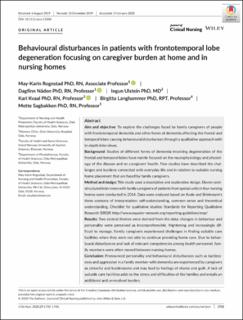| dc.contributor.author | Rognstad, May Karin | |
| dc.contributor.author | Nåden, Dagfinn | |
| dc.contributor.author | Ulstein, Ingun | |
| dc.contributor.author | Kvaal, Kari | |
| dc.contributor.author | Langhammer, Birgitta | |
| dc.contributor.author | Sagbakken, Mette | |
| dc.date.accessioned | 2021-02-26T11:16:36Z | |
| dc.date.available | 2021-02-26T11:16:36Z | |
| dc.date.created | 2020-04-07T11:21:01Z | |
| dc.date.issued | 2020 | |
| dc.identifier.citation | Journal of Clinical Nursing (JCN). 2020, 29 1733-1743. | en_US |
| dc.identifier.issn | 0962-1067 | |
| dc.identifier.uri | https://hdl.handle.net/11250/2730628 | |
| dc.description.abstract | Aim and objective To explore the challenges faced by family caregivers of people with frontotemporal dementia and other forms of dementia affecting the frontal and temporal lobes causing behavioural disturbances through a qualitative approach with in‐depth interviews. Background Studies of different forms of dementia involving degeneration of the frontal and temporal lobes have mainly focused on the neurophysiology and physiology of the disease and on caregivers’ health. Few studies have described the challenges and burdens connected with everyday life and in relation to suitable nursing home placement that are faced by family caregivers. Method and design This study used a descriptive and explorative design. Eleven semi‐structured interviews with family caregivers of patients from special units in four nursing homes were conducted in 2014. Data were analysed based on Kvale and Brinkmann's three contexts of interpretation: self‐understanding, common sense and theoretical understanding. Checklist for qualitative studies: Standards for Reporting Qualitative Research (SRQR) http://www.equator-network.org/reporting-guidelines/srqr/ Results Two central themes were derived from the data: changes in behaviour and personality were perceived as incomprehensible, frightening and increasingly difficult to manage. Family caregivers experienced challenges in finding suitable care facilities when they were not able to continue providing home care. Due to behavioural disturbances and lack of relevant competencies among health personnel, family members were often moved between nursing homes. Conclusion Pronounced personality and behavioural disturbances such as tactlessness and aggression in a family member with dementia are experienced by caregivers as stressful and burdensome and may lead to feelings of shame and guilt. A lack of suitable care facilities adds to the stress and difficulties of the families and entails an additional and unresolved burden. Relevance to Clinical Practice The study reveals a need for more knowledge among those organising health services as well as healthcare professional dealing with this patient category to ease the burden on next of kin. | |
| dc.language.iso | eng | en_US |
| dc.title | Behavioural disturbances in patients with frontotemporal lobe degeneration focusing on caregiver burden at home and in nursing homes. | en_US |
| dc.type | Peer reviewed | en_US |
| dc.type | Journal article | en_US |
| dc.description.version | publishedVersion | |
| dc.source.pagenumber | 1733-1743 | en_US |
| dc.source.volume | 29 | en_US |
| dc.source.journal | Journal of Clinical Nursing (JCN) | en_US |
| dc.identifier.doi | 10.1111/jocn.15208 | |
| dc.identifier.cristin | 1805535 | |
| cristin.ispublished | true | |
| cristin.fulltext | original | |
| cristin.qualitycode | 2 | |
